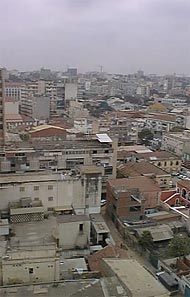The Resource Curse: the paradox of plenty, mortgaging oil revenues, the threat of elections
 The Luanda skyline shrouded by the morning smog (Photo by Kristin Reed) |
The desperate poverty and incredible inequality within a number of oil-producing countries like Angola has often been attributed to "the resource curse." This theory was developed by economists Sachs and Warner in order to explain the shocks caused by the infusion of oil revenues into petroleum-producing economies and the resulting difficulties local producers face due to high input costs and unfavorable exchange rates. The first incidence of economic crisis due to the influx of oil revenues was in Holland; hence the oft-used term "Dutch Disease."
Angola is certainly cursed by impoverishment and vast inequities, but these problems should not be attributed to economics alone. The past years of war as well as present day decisions play a large role in Angola.
While the resource curse may be able to account for fiscal problems like runaway inflation rates, it cannot explain problems such as personal diversions of public funds or miniscule state budgets for social services. Terry Lynn Karl's The Paradox of Plenty explains that the resource curse isn't a given: states with high barriers to policy change and government dependency on oil rents have conditions that can lead to poor decisions on the use of oil revenues. Michael Ross also suggests that weak institutions are responsible for faulty decisions. Indeed, the Shetland Islands present a case in which strong institutions and the participation of civil society have created positive development from oil revenues. Oil production does not categorically portend poverty and inequality.
Angola's 27-year curse of war has been lifted. Though the people have embraced the end of war and the government has provided generously for demobilization of ex-UNITA combatants and their families, the history of war haunts this country in a menacing way: debts. During the war, the government took out high-interest loans in order to finance the military expenditures needed to win the war. The majority of these loans are oil-guaranteed, meaning that the country's future oil production has been mortgaged to pay off the arms deals of the past.
In 2000, 13.6 percent of Angola's GDP went to debt servicing. At the close of September 2000, the external debt was estimated at $8.5 billion. In order for the country to qualify for refinancing at lower interest rates, the government must accept the conditions of transparency (open accounting) and accountability. Such a commitment also would reinforce the legitimacy of the state, a legitimacy that has been questioned by Global Witness. In a searing report, Global Witness revealed the misappropriation of $1 billion annually from Angola state coffers in the past two years.
During the war, the government maintained that transparency constituted a threat to state security, but this excuse has since been invalidated with the signature of peace accords in April 2002. Civil society is gathering strength: Angolans are insisting to see just where the resource wealth of their country is going. At the end of May, protesters gathered under the statue of the nation's founding father, Agostinho Neto. They demanded transparency and called for an end to the patronage networks that impede the investment of resource wealth in social services programs. It seems that the threat of elections in 2005 coupled with the scrutiny of donor agencies, watchdog groups and international financial institutions may have caught the government's attention: Deputy Prime Minister Aquinaldo Jaime delivered a speech at an oil industry conference in late June in which he assured that future state budgets would be transparent. However, the Deputy Prime Minster neglected to attach a timeline to this bold promise.
Opacity is the curse of this country, but Angolans are sweeping away the cloudy excuses of the past and looking to a bright, transparent future. To the emboldened members of civil society, transparency and accountability are no longer a question of "if" but "when."
— Kristin


